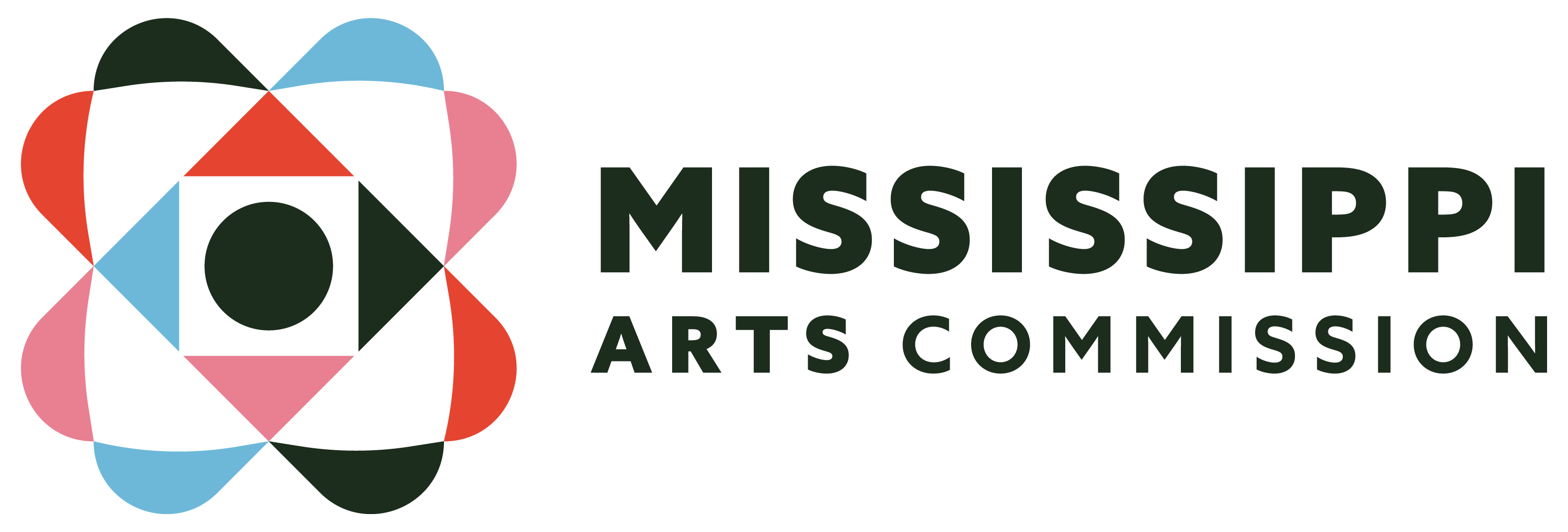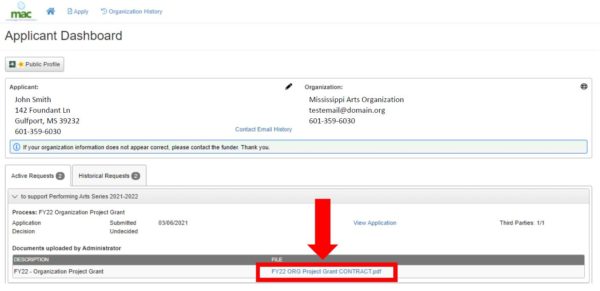Frequently Asked Questions
What type of activities does MAC fund?
MAC funds activities that promote public understanding and support of the arts and artistic excellence, including
- Performances, readings, exhibitions and related publications
- Workshops and artist residencies
- Arts research, planning, development, fieldwork and cultural documentation
- Information dissemination
- Services to artists and arts organizations
- Artistic and managerial professional development
- Projects that promote arts education
- Projects that increase access to the arts
- Commissioning of artwork
- Adding to museum collections
- Projects that increase resources for the arts
- General operating expenses of arts organizations
- Indirect costs of up to 10% of the total project budget
What does MAC NOT fund?
Grant funds may not be used for the following expenditures:
- Reductions
- Contingency funds
- Activities already funded in the state’s budget (for example, an organization receiving unrestricted funds from the state of Mississippi through another agency or line item may not receive general operating support from MAC.)
- An organization receiving MAC or other state funds for a partial project cannot apply to MAC for funding of the same project
- Individuals are only eligible to receive one Mini Grant per fiscal year
- Interest on loans, fines or litigation costs
- Food or beverages for hospitality or entertainment functions
- Projects primarily planned for fundraising purposes
- Lobbying expenses or other activities that are primarily political in nature;
- Tuition or scholarships for academic study
- Monetary awards for competitions
- College and university events that are considered a part of regular or extracurricular programs
- Purchase or long-term rentals of equipment, property or collections
- Out-of-state tours or travel to competitions
- School-sponsored trips, including transportation, admission fees, and other related travel expenses
- Capital improvements, facility construction, or renovation work (except through the BFA grant program.)
- Activities where the primary focus is for therapy
- Creation of sexually explicit content.
- Programs for a religious purpose, including for the promotion of any sect, church, creed, or sectarian organization, nor to conduct any religious service or ceremony. Funds can be granted to religious organizations as long as the funds are not used for a religious purpose. This allows faith-based organizations to apply on behalf of its community for arts activities or programming where artistic expression is the primary focus.
If grant funds are limited in any fiscal year, priority will be given to new and underserved applicants and in support of accessible programming.
Applications from colleges, universities and other state-level schools are only eligible if they include and benefit the general public. College and university events that are considered a part of regular or extracurricular programs, or whose primary purpose is to offer academic credit, are not eligible for grants. If funding is limited, requests from public colleges and universities will receive lower priority.
Which grant should I apply for?
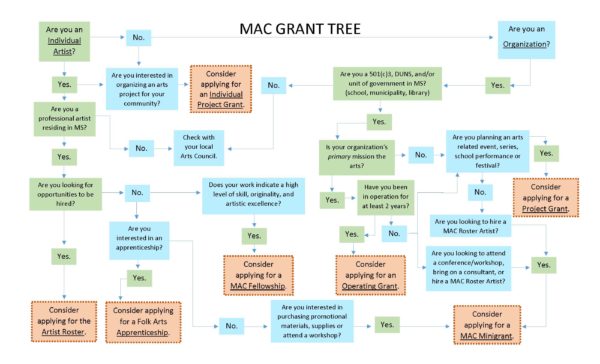
If you have any questions about eligibility or require further information about grant opportunities, MAC encourages you to consult the resources on the MAC website and contact a program director.
How does MAC decide which grant applications to fund?
Grant applications received by MAC on the March deadline are reviewed by a panel of Mississippi residents and out-of-state experts. Artists, arts administrators, arts educators, arts volunteers, and community representatives make up the panels that evaluate applications based on the review criteria. Previous years’ grant files may be made available to panelists upon request. Panelists do not make actual funding decisions. They provide recommendations and feedback to MAC’s board on the quality of each application.
MAC’s review panels are open to the public and applicants are encouraged to attend in order to observe the review of their application and others within the same category. Applicants are also encouraged to utilize the reviewer’s comments as a management tool. MAC notifies all qualified applicants of the panel review dates and times.
Anyone can recommend a potential panelist; MAC’s Commissioners approve these nominations. Panelists may serve for no more than three consecutive years. Each panel has representatives from across Mississippi and in some cases an out-of-state panelist. A list of last year’s panelists is available by calling MAC’s office. Nominate a panelist or request to be a panelist by emailing grants@arts.ms.gov.
COMMISSION FUNDING AND APPROVAL
After reviewing the grant applications, panelist recommendations and (if necessary) the applicant’s final reports from previous years, MAC’s Board of Commissioners determines the final grant awards. The Commissioners also consider
- Commission goals and outcomes
- Adherence to Commission policies
- The geographic distribution of funds
- The diversity of arts disciplines represented by the projects
Depending on the availability of grant funds and the number of requests, the Commissioners may fund only a portion of the amount requested. The Commission is not obligated to fund any application.
All grants are reviewed by panel process with the exception of Mini-grants, which are reviewed by the program staff and the Commission’s Mini-grant Committee. The final review and funding decisions for Mini-grants are made by the full Board of Commissioners.
List of grants awarded by MAC for the most recent fiscal year
This is my first time to apply for a MAC grant. Any advice?
Organizations or individuals who are applying to MAC for the first time are encouraged to review the Frequently Asked Questions and tutorials available on the website and then call MAC offices for assistance in registering and applying in eGRANT. Faxed, mailed, or emailed applications are not accepted. If you are new to eGRANT, please refer to MAC’s video guides on how to create an account or how to apply for an Individual Mini-grant. Please contact MAC staff if you have questions. Applicants must request a review of their application by contacting MAC staff at least two weeks ahead of the grant deadline if they require assistance.
How do I register a new account in eGRANT?
How do I start a new application in eGRANT?
Who is the project director?
Organizations applying for funding must list two personnel on the grant: project director & authorizing official. The project director is the primary point of contact for MAC staff. The project director should be a member of staff or volunteer at the organization who will be responsible for submission of the grant application, management of the grant activities, and completion of the final report. An individual who has impermanent placement at an organization, such as an intern, temp or seasonal worker should not serve as an organization’s project director.
If the project director changes during the grant period, then the organization should contact MAC to add a new project director. The project director cannot be the same individual who serves as the authorizing official.
Who is the authorizing official?
Organizations applying for funding must list two personnel on the grant: project director & authorizing official. The authorizing official is responsible for approving grant applications, contracts and final reports on behalf of the organization. The authorizing official must be an individual who has fiscal authority at the organization such as an executive director, financial officer, board president or treasurer.
If the authorizing official changes during the grant period, then the organization should contact MAC to add a new authorizing official. The authorizing official cannot be the same individual who serves as the project director.
What is a SAM.gov Unique Entity ID?
In 2022, the federal government transitioned from the use of the DUNS Number to a new SAM.gov Unique Entity ID (UEI) as the primary means of identification required to apply for and receive federal funding. Due to federal regulations, MAC will be unable to award any funding to organizations that fail to provide this information. It is 100% free for an organization to request a UEI, and you need not complete the full SAM.gov registration in order to obtain your ID. Follow the steps outlined in this guide to obtain your organization’s UEI. For further assistance in obtaining a SAM.gov UEI, you can reach the help desk by calling 866-606-8220 to speak to a registration specialist.
TIP: When registering for a SAM.gov UEI, be sure to enter your organization name and address identically to the information listed on your existing DUNS registration.
How do I access an application I've already started in eGRANT?
At the bottom of your application, you have the option to save your current progress and access the form later to complete it. You are encouraged to save every time you navigate away from your eGRANT application. When you are ready to open an application on which you have previously worked, log in to your eGRANT account and select “Edit/View Application” at the bottom of your screen. See image below for reference.
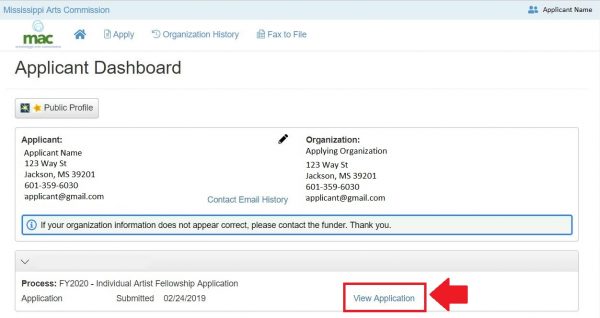
How do I check if my Authorizing Official has signed my grant form?
Organizations are required to have two personnel listed on their grant application: Project Director & Authorizing Official. The Project Director completes the application in eGRANT and manages the grant throughout the year; whereas, the Authorizing Official reviews & approves required documentation such as the application, grant change forms, and Final Report.
If you have completed your grant form, then you are ready to send your Authorizing Official an email through the eGRANT system requesting approval & press submit on the application.
To check the status of your Authorizing Official’s signature,
- Login to eGRANT.
- Open the form:
- For applications, click “View Application”
- For Final Reports, click “Edit” under Follow Up Forms
- Scroll to the very bottom of the page to check for a submission receipt. (see image below for example)

How do I access my grant contract?
You grant contract is available in the applicant’s eGRANT dashboard.
- Click here and you will be directed to MAC’s online eGRANT system.
- Login to your eGRANT account.
- Locate the current grant request on your dashboard.
- Click the file name to download the grant contract under the section identified as “documents uploaded by administrator.” (see below)
How do I access my Final Report?
To access the online report form, click here and you will be directed to MAC’s online eGRANT system. You will need to enter your username and password and the form is located in the Follow Up section on your dashboard. See image below for reference.
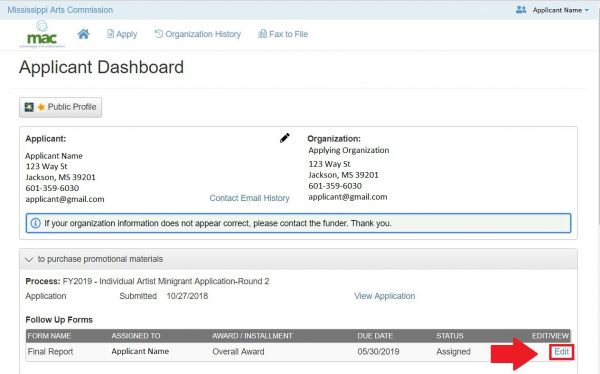
How do I upload multiple files to a form in eGRANT?
Applicants can only upload ONE file per upload button. When an applicant uploads additional files (i.e. images or documents) into the same field in an eGRANT form, the first file is deleted automatically in order to upload the additional file. If you have multiple files all of which are necessary to address the instructions in your eGRANT form, you will have to merge them into a single file in order to upload both. Follow the tutorials below to learn how to combine files using Adobe:
- How to convert files (both images and documents) to PDF
- If the file size is too big or you need to upload multiple files into a single field, converting your file to a PDF is the first step! Check out this easy tutorial on how to convert a document (Word, Excel, PDF, etc.) or image (JPEG, PNG, TIFF, etc.) to a PDF.
- How to combine files (both images and documents) in Adobe PDF
- If you have multiple files to upload in a single field in eGRANT, check out this tutorial on how to easily merge files into a single PDF. This tutorial works for both images and documents.
- How to create a Reduced Size PDF
- If the file size of the document you need to upload is too large, check out this tutorial on how to easily reduce the size of a PDF.
What types of files does MAC recommend applicants use in eGRANT?
Ineligible File Types: Items uploaded from the following file types will be disregarded in adjudicating applications and may result rejection of an application for incompletion:
- Pages (.pages)
- Numbers (.numbers)
- Keynote (.key)
Video & Audio
- If you share media from your website, link directly to the video/audio rather than the home page.
- MAC recommends applicants upload using the following file types: MP3, MOV, MP4, WMV, WMA.
- MAC recommends applicants upload links to video or audio files. Applicants can link to websites such as YouTube, Vimeo, Soundcloud, Bandcamp, etc.
Images & Documents
- MAC recommends applicants upload using the following file types: Word (.doc or .dox), Excel (.xls, .xlr, or .xlsx), PDF (.pdf), or JPEG (.jpeg).
- You may upload links contained in a Word Document or PDF.
How do I download a copy of my eGRANT application?
Follow the direction below or download the visual guide: “How to Download a Copy of Your Grant Application.”
- Login to your eGRANT account.
- If you haven’t begun your application, from your Dashboard, click Apply and follow the directions to begin the application. If you have already begun your application, click on your application from your Dashboard.
- Click “Application Packet” to open a downloadable PDF of your grant application. (this download button is located beneath your contact information and above the application)
- The PDF will automatically open in a new tab or window. You may now download and/or print your grant application.
The file size is too big! How do I upload supplemental materials and work samples in eGRANT?
Fellowship Applicants
- Fellowship applications are blindly adjudicated by a panel of experts. These experts have access to an applicant’s Artist Statement, Biographical Description of Artist Development, and Work Samples. The applicant’s name should not appear in the text responses to the Artist Statement or the Biographical Description of Artist Development or in the file name, URL, or content of Work Samples (including: credits in a video or document or the content of a linked webpage).
- Do not link to the applicant’s personal social media pages or website in the Artist Statement or Biographical Description of Artist Development or as a Work Sample. Areas of the application which include the applicant’s name will be disregarded in adjudicating applications and may result rejection of an application for being incomplete.
Video & Audio
- How to Upload Work Samples with a Google Drive Link
- If you already have a Gmail account, this may be the easiest option for you.
- How to Upload Work Samples with a Dropbox Link
- If you already have a Dropbox account, this may be the easiest option for you.
- How to Upload Work Samples with link from a video/audio sharing platform
- If you already have an account on a major video/audio sharing platform (Youtube, Vimeo, Bandcamp, Soundcloud, etc.), this will likely be the easiest option for you.
- Remember: If you are applying for a Fellowship, your name cannot appear on the web-page, in the URL, or in the content of the video/audio clip. Fellowship applicants may wish to use another method to maintain anonymity.
Images & Documents
- How to convert files (both images and documents) to PDF
- If the file size is too big or you need to upload multiple files into a single field, converting your file to a PDF is the first step! Check out this easy tutorial on how to convert a document (Word, Excel, PDF, etc.) or image (JPEG, PNG, TIFF, etc.) to a PDF.
- How to combine files (both images and documents) in Adobe PDF
- If you have multiple files to upload in a single field in eGRANT, check out this tutorial on how to easily merge files into a single PDF. This tutorial works for both images and documents.
- How to create a Reduced Size PDF
- If the file size of the document you need to upload is too large, check out this tutorial on how to easily reduce the size of a PDF.
If my grant is funded, when and how do I find out?
MAC notifies grant applicants who applied on the March deadline of its funding decisions by e-mail no later than the first week of July. After receiving notification, an applicant may request a copy of their panel comments or discuss the decision with the program staff.
Mini-grants are awarded twice per year. Applicants will be notified no later than the first week of the month following the deadline when they submitted their application.
All awards are contingent upon the availability of state and federal funds.
How can I market myself as a Roster Artist?
The Mississippi Artist Roster program is a listing of professional Mississippi artists who have been reviewed and approved by a panel of experts and are available to do performances, workshops, and other presentations in a wide range of settings around the state. Schools, community arts groups, libraries and other organizations use the Roster to identify potential artists who can present at their venues. Acceptance to the Roster does not guarantee its members bookings or contracts to perform, and agency does not handle booking or contract arrangements. However, the Roster can be a useful tool for artists to use in promoting themselves and expanding their performance or workshop opportunities.
MAC promotes the Roster as a whole. Though the agency does not promote individual Roster Artists, MAC has promotional materials available to help Roster Artists market themselves:
MAC’s Mini-grant Program provides funds eligible organizations* to hire Roster Artists. Mini-grants can pay for up to half of the total fee of a performance, workshop, or other presentation by a member (or members) of MAC’s Artist Roster. Organizations may not request Mini-grant funding for the same Roster Artist in consecutive years or for artists who failed to reapply to the Roster.
* To be considered eligible an organization must: (1) Be based in Mississippi. (2) Be incorporated in Mississippi as a 501(c)3 nonprofit organization OR (3) Be a unit of local government, such as a school, library, or another county or municipal agency. Units of local government may be required to provide documentation of their status as a governmental agency. Please call MAC offices with any questions related to eligibility before you apply.
I received a grant! What do I do now?
Applicants who are awarded a grant will receive notification via email. Depending on the type of grant received, the grantee will be requested to sign and return documents (contract & W-9). Grantees receiving a cash award must sign up with Paymode for the payment to be direct deposited into your account.
Grant contracts will specify the grant award amount and the reporting requirements. The signed contract should be on file before the beginning date of the project. Grant funds will not be disbursed until the contract is returned and approved by MAC. Organizations receiving funding must have their authorizing official sign and return the contract to MAC along with the other pertinent documents. Failure to sign and return the contract within 60 days of receipt may result in cancellation of the grant.
Note: The payment for Artist Mini-grant recipients is disbursed upon the approval of the completed final report.
As a grantee, what are my responsibilities to MAC?
The grant recipient should keep accurate records of the project and all income and expenditures relating to the grant for three years. Financial records must be kept according to generally accepted accounting principles and be made available upon request by MAC or the National Endowment for the Arts.
Final Reports
Grantees must submit a final evaluation and financial report, which includes a final narrative, statistical and financial information and support documentation, postmarked no later than 30 days after the completion of the project OR by May 15 , whichever comes first. Use forms from Grant Forms and Resources to complete final reports.
Failure to submit final reports by the deadline jeopardizes final grant payments and future funding. Final reports more than 45 days late will result in the forfeiture of the grantee’s final payment. Only extreme and unforeseeable reasons explained in writing within the 45 days will be considered for exception. New grants will not be made to an organization that has not submitted final reports.
How can I appeal a grant decision?
The appeals process provides for a review of the method and fairness of the Commission’s decision concerning a grant application. Dissatisfaction with the denial or amount of an award is not sufficient reason for an appeal. For an appeal to be considered, you must show evidence that the panelists and Commissioners
- Reviewed the application using criteria other than those published;
- Were influenced by members who failed to disclose conflicts of interest
- Did not have access to all application materials submitted by the deadline.
If appealing a funding decision, the applicant should first call the appropriate program director to review the considerations affecting the Commission’s decision. If you wish to pursue an appeal, you must send a written request to MAC’s Executive Director within ten days of the date of notification of the Commission’s decision. The letter should be sent certified mail, return receipt requested, postage prepaid. It should contain evidence to support one of the grounds for appeal as listed above.
The Commissioners will review the appeal at their next scheduled meeting following receipt of the written appeal. The applicant may appear in person before the Commissioners at this meeting.
Incomplete applications are not eligible for the appeals process.
Something happened, and I need to make a change to my grant. Can I do that?
Funds must be spent only on the activities listed in the grant application. Organizations must request approval in writing on MAC’s Grant Change Form before making changes in the project’s personnel, activities or budget. Project personnel include the project director or authorizing official who signed the application and contract, or any other personnel identified in the application including teachers and artists. Major changes may require reconsideration of funding by MAC.
If major changes are not reported before the final report is submitted, the grantee may be asked to refund the grant’s initial payment and to forfeit the final payment. Further, if such changes warrant the cancellation of a grant, MAC may withhold future grants from that organization.
For what reasons could MAC cancel a grant?
MAC has the right to withhold or cancel grants for any of the following reasons:
- Failure to meet a published deadline for filing grant reports,
- Failure to notify MAC prior to a change in the project or personnel,
- Failure to comply with the terms of the grant contract, or
- Failure to raise the required cash match.
If MAC cancels a grant, it may withhold future grants from that organization.
